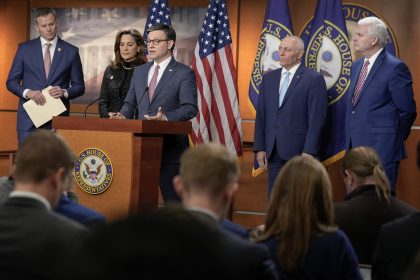Lofgren Announces FISA Amendment Agreement, Clearing Way for House Vote

WASHINGTON – Rep. Zoe Lofgren, D-Calif., announced Tuesday there will be a vote tomorrow on a measure she’s championed to prohibit the collection of Americans’ internet search history and web browsing data without a warrant.
Since January, Lofgren, Rep. Warren Davidson, R-Ohio, and a bipartisan coalition of like-minded colleagues, have been trying to close loopholes and strengthen oversight to prevent overreach and abuse under the Foreign Intelligence Surveillance Act.
Last week, Lofgren and Davidson sent a letter to the House Rules Committee urging the body to consider their amendment when writing the rule for reauthorizing the Act.
Specifically, the amendment sponsored by Lofgren and Davidson would end the indiscriminate collection of massive amounts of domestic communications; prohibit warrantless collection of geolocation and web browsing data by intelligence agencies; and ensure the intelligence community is held to the standards established under the Fourth Amendment.
In a statement released Tuesday, Lofgren said, “after extensive bicameral, bipartisan deliberations, there will be a vote to include a final significant reform to Section 215 that protects Americans’ civil liberties.”
That vote is expected sometime Wednesday afternoon, before debate and a vote on the reauthorization of the Act.
“Our internet activity opens a window into the most sensitive areas of our private life, and, this week, representatives will be able to vote to prevent the government from using Section 215 to collect the websites we visit, the videos we watch and the searches we make,” Lofgren said.
“Without this prohibition, intelligence officials can potentially have access to information such as our personal health, religious practices, and political views without a warrant. As such, I urge my colleagues to support the Lofgren-Davidson amendment and Americans’ Fourth Amendment rights.”
The amendment – which is supported by Reps. Adam Schiff, chair of the House Permanent Select Committee on Intelligence, and Jerrold Nadler, chair of the House Judiciary Committee – is an outright prohibition: if passed the government will not be able to use Section 215 to collect the websites that a U.S. person visits, the videos that a U.S. person watches, or the search queries that a U.S. person makes.
Further, if the government is not sure if someone is a U.S. person, but could be, it cannot get their internet activity without a Title I FISA warrant.
If the government wants to order a service provider to produce a list of everyone who has visited a particular website, watched a particular video, or made a particular search query, the government cannot make that order unless it can guarantee that no U.S. persons’ IP addresses, device identifiers, or other identifiers will be disclosed to the government.
This amendment does not allow for the incidental collection of a U.S. persons’ web browsing or search information when the target is a specific-selection term that would or could produce such information.
This prohibition is a strict liability-type provision. In other words, it isn’t a knowledge standard or a reasonable-belief standard. An order must not result in the production of a U.S. person’s web browsing or search information.
If the order would or could result in the production of a U.S. person’s web browsing or search information, the government cannot order it without a Title I FISA warrant that must be narrowly tailored toward the subject of the warrant.
“I’ve been working for more than 15 years to secure real reforms to Section 215 and FISA,” Lofgren said. “With this final provision included, Congress can finally pass a meaningful and bipartisan reform package to improve our country’s powerful surveillance programs.”
























